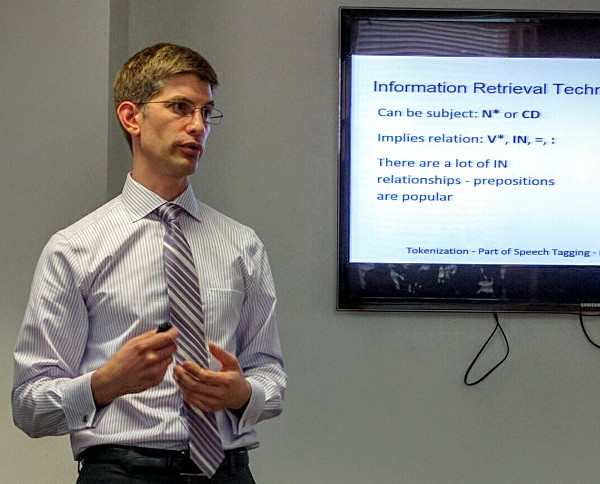And here it is almost a year since my last post but I now have something worthwhile again. Below is my application essay for the Industrial and Systems Engineering department’s Patterson award at UF. I felt it was a good summary of what I’ve done over the course of my studies at the University of Florida on my way to finishing my Masters’s in Industrial Engineering.
As a non-traditional student, the Industrial Engineering Master’s program at the University of Florida has been a transformative experience. I took classes part time for three years and the longer time scale provided me with an opportunity to relate each class in turn to my career. It allowed time for my connection to the UF community to become much stronger by providing more opportunity to interact with multiple cohorts of students across many semesters. My degree, and the experiences it represents, have given me new opportunities in my current job and will allow me to direct my career towards my goal of doing open data science research with the biodiversity community in the future.
The Industrial Engineering master’s degree program at UF offers flexibility. After I found a new interest in data science during the operations research course, I was able to take related courses in the Computer and Information Science and Engineering department. The courses in Algorithmic Economics and Bioinformatics provided specific applications of the mathematics and statistics from the core Industrial Engineering courses. During my final semester I completed a Special Projects class supervised by Dr. Panos Pardalos. I presented my project titled “Towards Mining Whole Museum Collections Datasets for Expanding Understanding of Natural History Collections” to an audience of industrial engineering graduate students and biodiversity professionals. I truly enjoy bringing together diverse groups and helping them find where their interests overlap.
The most significant contribution I made to the UF community was helping to found the Data Science and Informatics student organization (DSI). My role in DSI has been a blend of both student-learner and advisor. My knowledge and enthusiasm towards data science was similar to the other student members and we learned as peers during workshops and joint projects. I have also been able to bring my computing, managerial, and institutional knowledge to the group in an advisory capacity. While the student officers picked the direction of the group, I provided them with techniques for hosting great events, technical infrastructure, and faculty participants for their events. Along with everyone else’s enthusiasm and hard work, my contributions have been critical to building a wildly successful data science community which has grown to more than 500 members in just one year.
After graduating this spring, I will be continuing in my current position at the Advanced Computing and Information Systems Lab in the Electrical and Computer Engineering department. After discussions with the lab’s director, I am now responsible for producing collaborations that tie the research done within our lab to research done in other domains. One of the first examples of this will be extending my final project to include collaborators from the biodiversity informatics community. We are expecting to present a platform that allows biologists to use big data analytics tools like Apache Spark on museum collections data at conferences in Berlin and Costa Rica later this year.
Here is documentation of me presenting my final project titled “Towards Mining Whole Museum Collections Datasets for Expanding Understanding of Natural History Collections”
